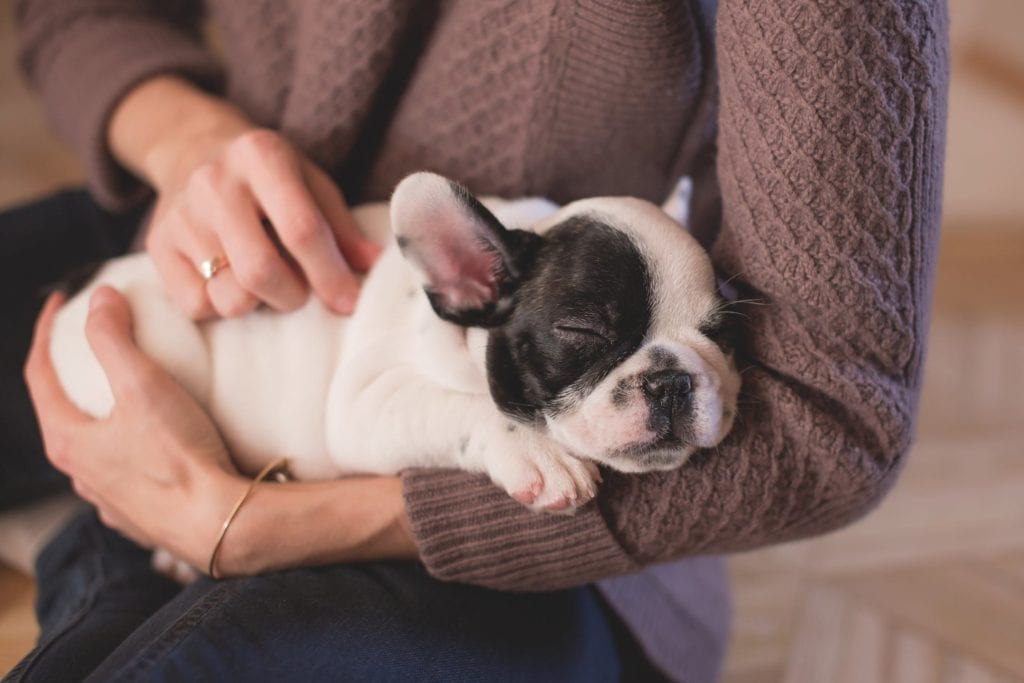Congratulations! You are the proud parent of an adorable puppy! You are so excited about this little bundle of fluff; you bought all the best treats and toys for your new best friend and are ready to try them all out. Your puppy plays for what seems like hours nonstop, and you start to notice they are getting a little too mouthy, jumpy, and barky! It can be very overwhelming to be a puppy, and sometimes they need our help to know when it is time to take a break. Let’s talk about Puppy Nap Time!
Puppy Nap Time is a staple in my personal puppy-raising philosophy: puppies need tons of sleep to help them grow big and strong, but the world is so cool and interesting that they can be too distracted to rest. This is where you, puppy parent, come in to save the day by implementing periods of calm, quiet time in your puppy’s busy schedule. Here are some signs that your puppy needs a nap:
Excessive Mouthing
When your puppy starts chewing on your hands, feet, or things they are not supposed to (socks, shoes, pillows, furniture) this may be a sign that they need a nap! This is not to be mistaken with curious mouthing/teething (checking out textures and mouth feel to relieve sore teeth) or play mouthing (puppy is easily redirected onto a toy). Excessive mouthing when tired is constant chewing and puppy does not respond to a consequence or a redirection to a toy.

Excessive Activity
When your puppy starts jumping on you, furniture, or starts zooming around without worrying about obstacles or personal space it may be a sign that your puppy needs to take a break! The puppy is unable to be redirected to a desirable behavior or settle down, even when being picked up and held. This should not be mistaken for excitement to stimuli, which the puppy can generally be redirected or distracted from using a treat or a toy.
Excessive Barking
When your puppy starts barking, growling, or squeaking incessantly. This may be directed at a person or an object. When the barking is a result of being tired, the puppy will not respond to a redirected to do a desirable behavior. Excessive barking is generally paired with Excessive Mouthing and Excessive Activity.
There are several ways to prepare a space for a puppy that needs a nap! You can choose to pen your puppy, which involves setting up an area within an exercise pen or a human child’s play pen. Puppy pens tend to have a bed, a few soothing toys (a bone filled with peanut butter, a durable soft toy with no squeaker, or a puppy teething toy), and may include a puppy potty area for those who decide they want to pad or turf train their puppies. Sometimes the puppy will still be jumpy and barky in the pen, but do not give them any attention; it won’t be long until they settle down and go to sleep! Another option is a kennel, which come in several varieties! A puppy’s kennel should have enough room for them to stand up and turn around. A kennel is the best option if you are working to housebreak your puppy because puppies do not like to go to the bathroom where they sleep. The kennel can have a dog bed or crate pad, as well as the soothing toys mentioned above. With puppies who have a harder time settling in the crate, a fabric kennel cover is recommended to make it feel den-like and safe! The puppy may cry or whine a little at first for your attention before they realize how much they need a nap!
It is important that the puppy often naps in a space away from you. You want to create an atmosphere of safety and calm, not one of anxiety and dependency. To build an understanding partnership with your dog, you must teach them how to be confident on their own! Remember, your puppy was one of multiple babies in a litter, and always had mom around to snuggle. Your puppy will not be able to properly develop a sense of self if they are always with you. This can create behavior problems in your puppy later in life, like separation anxiety and hyper-active behavior. It is encouraged to take an occasional nap with your puppy to build your relationship, so treasure the times they put themselves to bed on your lap!
Naps can last anywhere from thirty minutes to a few hours. This is a great way to get your puppy used to periods of quiet and calm…and you can get some work done without having to worry about what your puppy is doing! This helps prevent separation anxiety, enforces boundaries, adds structure, and strengthens your bond. I recommend adding naps to your puppy’s daily routine.
Paw & Order Dog Training® is a registered trademark of Paw & Order, LLC. All brand or product names are or may be trademarks of, and are used to identify products and services of, their respective owners.
Paw & Order Dog Training® offers professional dog training in Western PA, Southwest FL (Ft. Myers/Cape Coral/Naples area), Twin Cities, MN (Minneapolis/Saint Paul area) Upstate SC (Greenville), Houston/Galveston, TX. Each Paw & Order location in independently owned and operated.
You don’t have to accept your dog’s bad behaviors. You can fix them, and our dog trainers can help! We will investigate and solve your dog’s behavior problems!